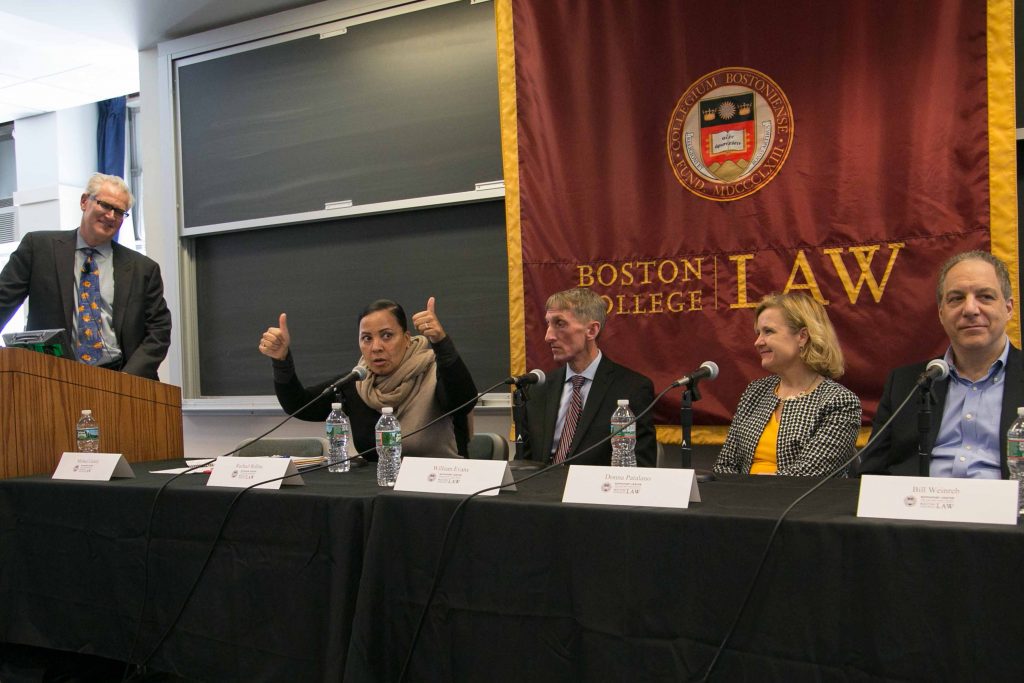When Rachel Rollins was elected Suffolk County District Attorney in November of 2018, the nation took notice. Her policy positions placed her into a new class of “progressive” prosecutors, and her promise to establish dismissal as the default option for fifteen nonviolent offenses was heralded as a way to shift the focus of the criminal justice system from those struggling with money, mental health, and addiction.
A similar prosecutorial mindset was on full display during the “Charging Decisions and Public Safety” panel, which took place on April 3. The event was co-sponsored by BC Law’s Criminal Law Society and Rappaport Center for Law and Public Policy, and drew a standing-room only crowd. Rollins’ co-panelists were former Boston Police Commissioner and current Boston College Chief of Police Bill Evans, the General Counsel to the Suffolk County District Attorney Donna Patalano, and former Acting US Attorney Bill Weinreb. Professor Michael Cassidy served as moderator.
A majority of the time was spent on Rollins’ proposed changes to the DA’s office. Each panelist expressed support for the new direction, though Evans admitted he was taken aback by the proposals at first. “I thought it was crazy” he laughed. However, after reflecting more deeply on the values he promoted as commissioner, he said he realized Rollins was simply taking the next step in creating a fairer system. “We were all about lifting people up more than locking them up,” he remembered. “The less people we put into the system, the more education and opportunity people will have.”
Likewise, Patalano stressed the need for more reliable data to ensure the new procedures are working as designed and to help the office make informed decisions in the future. Importantly, she said, more comprehensive information will allow for a clearer understanding of how the justice system treats “different people differently.” Patalano also emphasized that every person in the office, from senior-most attorneys to administrative staff, will receive training.
Rollins reiterated statements she made on the campaign trail. Speaking specifically to the 15 crimes that will receive the presumption of dismissal, she described them as “overwhelmingly crimes of poverty, mental illness, and substance abuse disorder. I want to get these people out of the criminal justice system and into the help they need.”
Further pointing to the gaps in federal and state structures that lead to overcriminalization and that are the driving force behind her ideas, she said, “I’m the catch basin at the end of five, six, seven systemic failures.” Echoing her point, Weinreb made it clear, even at the federal level, the criminal justice system “should not be a conveyer belt without anyone exercising their discretion.”
Weinreb and Rollins further discussed the productive but sometimes tense relationship between state and federal authorities, agreeing that each has its specialties but that federal authorities have immense discretion in choosing which cases are pursued, investigated, and prosecuted.
This is in direct contrast to the situation faced by state officials. Rollins and her staff are responsible for every crime committed in Suffolk County, she noted. As a result, most of her proposed policies are directed at exercising discretion while maintaining accountability. Reinforcing the low-level, nonviolent nature of the offenses she will decline to prosecute, she said, “I would not have done this if I believed crime would go up.”
As a final note, Rollins reminded the audience: “I’m in the community every single day. A system which works for the exclusive few is not happening on my watch.”
Photo, left to right: Professor Michael Cassidy, Suffolk County DA Rachel Rollins, BC Chief of Police Bill Evans, General Counsel to the Suffolk County District Attorney Donna Patalano, and former Acting US Attorney Bill Weinreb


